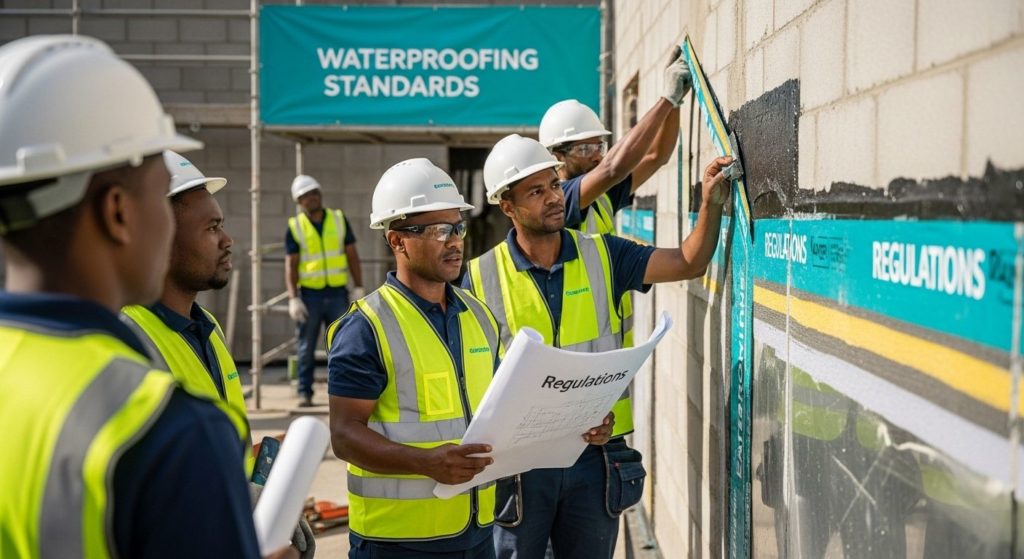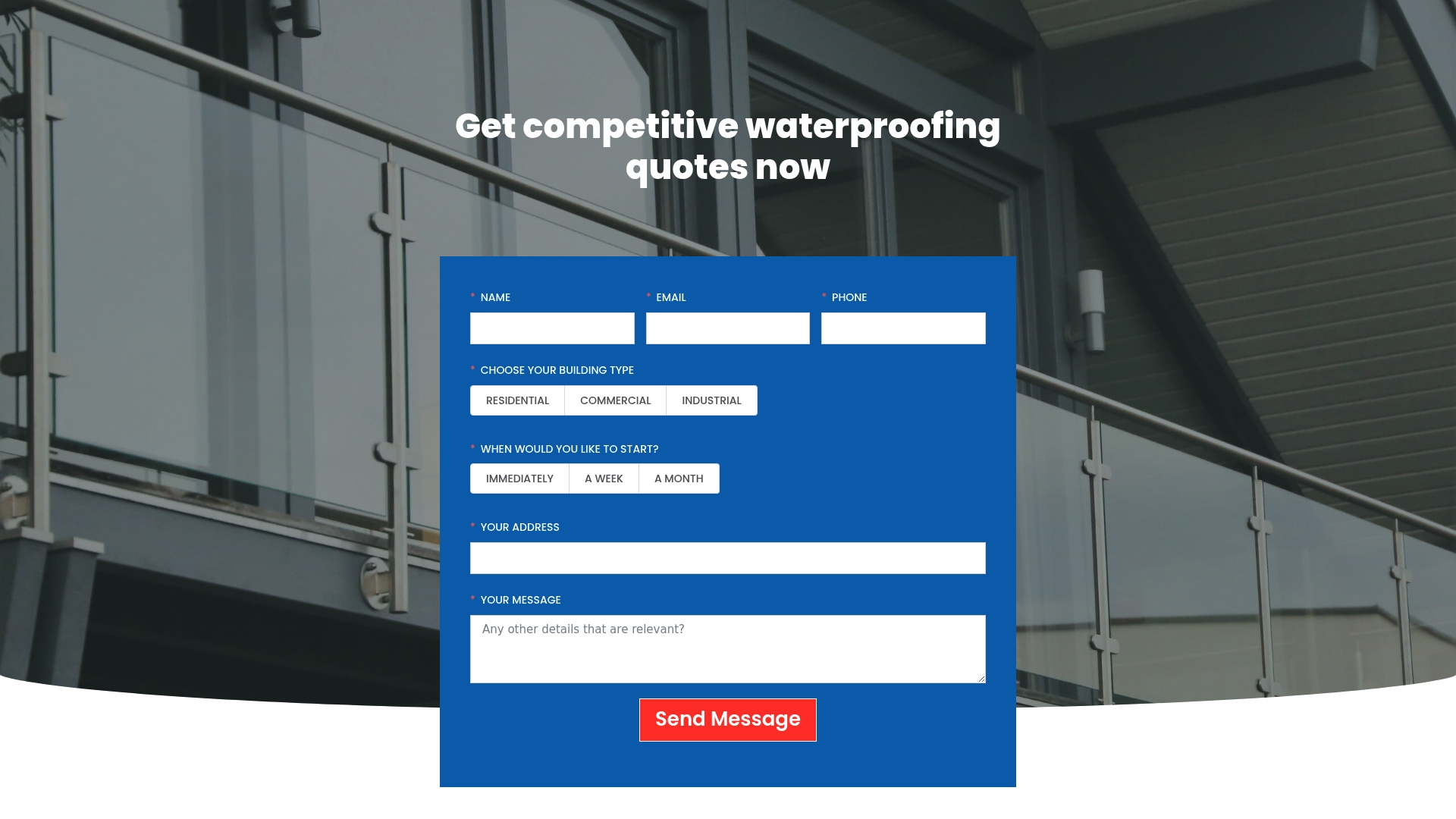Waterproofing regulations in South Africa shape how every building stands up to rain and rising damp. Certified waterproofing systems must meet strict technical standards, and failing to comply can invalidate your property insurance. Yet, most people assume these rules are just building admin. The surprise is they are actually the dividing line between a safe, valuable home and one plagued with costly structural damage in the future.
Table of Contents
- What Are Waterproofing Regulations In South Africa?
- The Importance Of Waterproofing For Property Owners
- How Waterproofing Regulations Impact Construction Practices
- Key Concepts And Standards In South African Waterproofing
- Real-World Implications Of Non-Compliance With Regulations
Quick Summary
| Takeaway | Explanation |
|---|---|
| Comply with waterproofing regulations | Adhering to South African waterproofing standards is crucial to prevent financial losses and legal issues. |
| Invest in quality waterproofing | Proper waterproofing protects structural integrity and preserves property value against moisture damage. |
| Understand health risks of moisture | Inadequate waterproofing can lead to mould and respiratory problems, impacting occupant health. |
| Utilise certified materials and methods | Employing approved waterproofing techniques ensures compliance and long-term effectiveness in moisture management. |
| Neglecting waterproofing can be costly | Failing to implement waterproofing may result in significant repair costs and compromised structural safety. |
What are Waterproofing Regulations in South Africa?
Waterproofing regulations in South Africa represent a critical framework designed to protect buildings, infrastructure, and property from water damage. These regulations establish comprehensive standards and guidelines that ensure construction projects maintain robust moisture protection strategies across residential, commercial, and industrial sectors.
National Building Standards and Compliance
The South African Bureau of Standards (SABS) plays a pivotal role in defining waterproofing requirements. Read more about our comprehensive waterproofing guide provides insights into how these national regulations impact construction practices. Key regulatory aspects include:
- Mandatory moisture barrier specifications for different building types
- Minimum performance standards for waterproofing materials
- Inspection and certification protocols for waterproofing installations
These regulations aim to prevent structural deterioration, mitigate potential health risks from moisture intrusion, and ensure long term building integrity. According to Agrément South Africa, approved waterproofing systems must demonstrate specific technical performance criteria that protect against water penetration.
Technical Performance Requirements
Waterproofing regulations in South Africa mandate rigorous technical evaluations for materials and installation techniques. Buildings must comply with specific moisture resistance standards that consider regional climate variations, including high rainfall areas like the Western Cape and subtropical zones in KwaZulu-Natal.
The regulations encompass detailed requirements for:
- Foundation waterproofing methods
- Roof membrane specifications
- Exterior wall protection techniques
- Underground structure moisture barriers
Contractors and property developers must obtain proper certification and follow prescribed installation guidelines to ensure regulatory compliance. Failure to meet these standards can result in potential legal consequences and compromised structural integrity.
The Importance of Waterproofing for Property Owners
Waterproofing represents a critical investment for property owners in South Africa, serving as a fundamental protective strategy against potential structural damage and financial loss. Beyond mere maintenance, effective waterproofing is a strategic approach to preserving property value and ensuring long term structural integrity.
Financial Protection and Property Value
Learn more about comprehensive waterproofing solutions that safeguard your property investment. Water damage can be catastrophically expensive, with repair costs potentially exceeding the initial waterproofing investment by several multiples. According to National Building Regulations, property owners are responsible for maintaining structural integrity, making proactive waterproofing a critical legal and financial consideration.
Key financial implications of neglecting waterproofing include:
- Potential structural damage requiring extensive repairs
- Decreased property market value
- Higher insurance premiums due to water damage risks
- Potential health hazards from moisture related complications
Health and Structural Integrity
Beyond financial considerations, waterproofing plays a crucial role in maintaining healthy living environments. Moisture infiltration can lead to mould growth, structural degradation, and potential respiratory health risks for inhabitants. Proper waterproofing prevents these issues by creating robust barriers against water penetration.
The comprehensive protection offered by professional waterproofing extends across multiple property elements:
- Foundation protection against ground moisture
- Roof membrane preservation
- Wall and exterior surface resistance
- Underground structure moisture control
Property owners must recognize waterproofing not as an optional expense, but as a fundamental investment in their property’s longevity, safety, and value. Proactive waterproofing strategies can potentially save thousands in future repair costs while maintaining a property’s structural and aesthetic quality.
How Waterproofing Regulations Impact Construction Practices
Waterproofing regulations fundamentally transform construction practices in South Africa, establishing comprehensive guidelines that reshape how buildings are designed, constructed, and maintained. These regulations create a systematic approach to moisture protection, compelling construction professionals to integrate advanced waterproofing strategies throughout the building process.
Design and Material Selection Requirements
Explore our advanced waterproofing techniques to understand the intricate regulatory landscape. According to National Building Regulations, construction practitioners must now adhere to stringent material performance standards that go beyond traditional building methods.
Key regulatory impacts on design and material selection include:
- Mandatory use of certified waterproofing materials
- Comprehensive testing requirements for moisture resistance
- Specific performance benchmarks for different building environments
- Detailed documentation and certification processes
Construction Methodology and Compliance
Regulations have dramatically altered construction methodologies, requiring a more holistic and scientifically rigorous approach to moisture management. Contractors must now demonstrate technical competence and implement precise installation techniques that meet national waterproofing standards.
The regulatory framework demands:
- Specialized training for waterproofing installation
- Detailed site inspections and quality control mechanisms
- Comprehensive risk assessment for moisture penetration
- Precise documentation of waterproofing implementation
These regulations effectively transform waterproofing from a peripheral consideration to a central element of construction planning, ensuring buildings can withstand South Africa’s diverse and challenging environmental conditions. Construction professionals must now integrate sophisticated moisture protection strategies from the initial design phase through final implementation, fundamentally reshaping traditional building practices.
Key Concepts and Standards in South African Waterproofing
South African waterproofing standards represent a sophisticated framework of technical specifications and regulatory requirements designed to ensure comprehensive moisture protection across diverse construction environments. These standards establish rigorous benchmarks that guide professionals in implementing effective waterproofing strategies.
Regulatory Foundational Standards
Discover comprehensive waterproofing solutions that meet national regulatory requirements. According to National Building Regulations, waterproofing standards encompass multiple critical dimensions of moisture management and structural protection.
Fundamental regulatory concepts include:
- Comprehensive moisture resistance performance criteria
- Detailed material specification requirements
- Installation methodology guidelines
- Systematic quality assurance protocols
- Environmental adaptation specifications
Technical Performance Evaluation
Waterproofing standards in South Africa mandate intricate technical assessments that evaluate moisture protection systems across various environmental conditions. These evaluations consider complex factors such as regional climate variations, soil composition, structural design, and potential water infiltration risks.
Key technical performance evaluation parameters encompass:
- Membrane durability and long term performance
- Water penetration resistance measurements
- Structural compatibility assessments
- Chemical resistance capabilities
- Temperature and stress tolerance
These sophisticated standards transform waterproofing from a simple protective measure into a scientifically rigorous discipline. Professionals must demonstrate comprehensive understanding of technical specifications, material interactions, and environmental dynamics to successfully implement effective moisture protection strategies across South Africa’s diverse construction landscape.
Real-World Implications of Non-Compliance with Regulations
Non-compliance with waterproofing regulations represents a significant risk for property owners, developers, and construction professionals in South Africa. The consequences extend far beyond simple administrative penalties, potentially resulting in substantial financial losses, structural damage, and legal complications that can dramatically impact property value and safety.
Financial and Legal Consequences
Learn about professional waterproofing protection to understand the critical nature of regulatory adherence. According to National Building Regulations, non-compliance can trigger severe repercussions that extend well beyond immediate construction challenges.
Potential financial and legal implications include:
- Substantial repair and remediation costs
- Potential legal liability for structural failures
- Invalidation of property insurance coverage
- Municipal enforcement actions and potential building use restrictions
- Significant reduction in property market value
Structural and Health Risks
Beyond financial penalties, non-compliance with waterproofing regulations introduces profound structural and health risks. Inadequate moisture protection can lead to progressive structural deterioration, creating environments conducive to mould growth, foundation instability, and potential health hazards for occupants.
Critical structural and health risks encompass:
- Accelerated structural material degradation
- Increased risk of foundation settlement
- Potential respiratory health complications from mould proliferation
- Compromised building integrity and safety
- Long term environmental contamination risks
Constructors and property owners must recognize that waterproofing regulations are not bureaucratic obstacles but essential safeguards designed to protect investments, ensure occupant safety, and maintain structural longevity.
The table below compares the financial, legal, structural, and health consequences of non-compliance with waterproofing regulations to highlight the real-world risks for property owners in South Africa.
| Consequence Type | Description |
|---|---|
| Financial | Substantial repair and remediation costs; increased insurance premiums |
| Legal | Legal liability for structural failures; invalidated property insurance |
| Structural | Accelerated material degradation; increased risk of foundation settlement |
| Health | Respiratory issues from mould proliferation; long term contamination risk |
| Property Value | Significant reduction in market value and higher risk of devaluation |
| Comprehensive understanding and proactive compliance represent the most effective strategy for mitigating potential risks associated with moisture intrusion and structural vulnerabilities. |
Protect Your Property and Stay Compliant with Expert Waterproofing
Navigating waterproofing regulations in South Africa can be overwhelming. The risk of water damage, unexpected costs, and potential legal hurdles are real concerns for any property owner. If you are uncertain about technical standards, installation requirements or compliance, you are not alone. Your property’s integrity – and your peace of mind – depend on taking action before costly issues arise. Want to see how professionals solve these challenges?
Take the first step today by discovering the full range of expert waterproofing solutions at Pro Waterproofing. Our specialists understand the complexities of local regulations and deliver certified, reliable protection for homes and businesses. Visit our Uncategorized – Pro Waterproofing section for more detailed insights on industry standards and practical advice. Ready to ensure your building is fully protected and compliant? Reach out now through our main page for a personal consultation or a fast, obligation-free quote.
Frequently Asked Questions
What are the key waterproofing regulations in South Africa?
Waterproofing regulations in South Africa establish standards for moisture protection in construction. Key elements include mandatory moisture barrier specifications, minimum performance standards for materials, and inspection protocols for compliance.
Why is waterproofing important for property owners in South Africa?
Waterproofing is crucial for property owners as it prevents structural damage from water infiltration, mitigates health risks associated with mould growth, and protects property value by maintaining structural integrity.
How do waterproofing regulations impact construction practices in South Africa?
Waterproofing regulations influence construction practices by requiring adherence to stringent material performance standards, necessitating the use of certified materials, and mandating thorough testing and inspection to ensure compliance with moisture management guidelines.
What are the consequences of non-compliance with waterproofing regulations?
Non-compliance with waterproofing regulations can lead to significant financial consequences, including repair costs, legal liabilities, and loss of insurance coverage. Additionally, it poses health and structural risks, such as mould growth and building instability.




